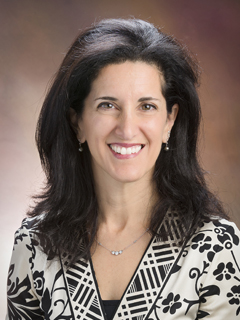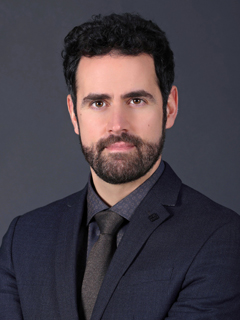HOW CAN WE HELP YOU? Call 1-800-TRY-CHOP
In This Section
College of Physicians Inductees, Immunotherapy Tool, Infantile Fibrosarcoma

This week In The News, join us in celebrating the induction of two CHOP researchers to the College of Physicians of Philadelphia. We also are highlighting a collaboration of CHOP and Stanford researchers to refine a platform that expands potential immunotherapy targets, as well as a CHOP-led study that proposes an oral drug could offer an alternative treatment option for infantile fibrosarcoma.
Dr. Joseph St. Geme and Dr. Meryl Cohen Inducted into College of Physicians
Congratulations to two CHOP physicians and researchers who were inducted as new fellows into the College of Physicians of Philadelphia.
Joseph St. Geme, III, MD, Chair of the Department of Pediatrics at CHOP, was nominated by Stephen Ludwig, MD, and Christina L. Master, MD, FAAP, CAQSM, FACSM.
"It's a great honor to be selected to join this prestigious organization and I look forward to contributing to the broad impact of the organization in advancing human health," said Dr. St. Geme, who is the Leonard and Madlyn Abramson Endowed Chair in Pediatrics at CHOP and professor of Pediatrics and Microbiology at the Perelman School of Medicine at the University of Pennsylvania.
Meryl S. Cohen, MD, MSEd, board-certified cardiologist in the Cardiac Center at CHOP, was nominated by Helen Pudlin, Esq., and Erica Thaler, MD, FACS. Dr. Cohen has practiced Pediatric Cardiology at CHOP for more than 30 years. She is also a Professor of Pediatrics at the Perelman School of Medicine, where she serves as Associate Dean for Faculty Development.
Dr. St. Geme and Dr. Cohen join a distinguished group of physician fellows in an organization that strives to advance the cause of health while upholding the ideals and heritage of medicine. The College of Physicians of Philadelphia, founded in 1787, is one of the oldest medical institutions in the United States.
Collaborative Research Develops AI-based Targeting Technology for Immunotherapy Using CARs and BiTEs
Collaborative research from CHOP and Stanford University demonstrated how an AI-designed protein engineering platform called TRACeR-I relies on a unique antigen recognition mechanism that could help researchers to leverage class I major histocompatibility complex (MHC-I) proteins for developing diagnostic and therapeutic applications. With more than 30,000 different versions of MHC-I proteins in humans, developing a robust treatment modality for immunotherapy development has proved challenging.
"Using X-ray crystallography, we revealed TRACeR-I's novel binding mechanism and how the structure of this platform is able to help it recognize MHC-I proteins that indicate cancer cells," said Nikolaos Sgourakis, PhD, Associate Professor in the Center for Computational and Genomic Medicine at CHOP.
Researchers at Stanford, led by Possu Huang, PhD, an Assistant Professor in the Department of Bioengineering, developed TRACeR-I, a breakthrough platform that recognizes many different versions of MHC-I proteins and can distinguish between healthy and diseased cells. CHOP researchers solved its 3D structure in complex with a tumor MHC-I antigen to demonstrate exactly how the TRACeR-I platform attaches to parts of the MHC-I complex that are conserved across different patients, while continuing to recognize the peptides that indicate cancer cells or other dangerous material being displayed on the surface.
In addition, the CHOP team used this to develop chimeric antigen receptors (CARs) and bispecific T cell engagers (BiTEs) for a tumor-specific antigen, demonstrating potent on-target killing of cancer cells. The team also developed a new TRACeR that recognizes a neuroblastoma-specific peptide, PHOX2B, paving the way for expansion of existing CAR T immunotherapy to an additional 21% of the pediatric patient cohort.
"With this collaborative work, we were able to take the initial design [from Stanford] and help refine it into an even more powerful tool with exciting therapeutic potential, to treat pediatric tumors with high unmet need." Dr. Sgourakis said.
The findings were published in Nature Biotechnology. Learn more in this CHOP news release.
Phase 2 Study Results Build Evidence for Larotrectinib as Frontline Treatment Option for Infantile Fibrosarcoma
Researchers at CHOP and the Children's Oncology Group (COG) conducted a Phase 2 clinical study that shows the oral drug larotrectinib was highly effective in treating newly diagnosed solid tumors that have a neurotrophic receptor tyrosine kinase (NTRK) gene fusion. The study results suggest larotrectinib is a possible frontline alternative to chemotherapy for patients with infantile fibrosarcoma and other NTRK fusion-positive solid tumors, according to the study authors.
"Our goal is always to present the safest and most effective treatment approach for our patients, which includes sparing them from the short and long-term complications of chemotherapy," said Theodore Laetsch, MD, the lead study author and a pediatric oncologist at CHOP.
Infantile fibrosarcoma is a rare, fast-growing tumor that often requires chemotherapy, which can pose serious harm to a young child's developing organs and tissues.
In 2018, the U.S. Food and Drug Administration approved the TRK inhibitor larotrectinib for patients with NTRK fusion-positive solid tumors that lack a satisfactory alternative or have progressed after treatment. However, the drug had not been studied as a frontline therapy.
CHOP and COG researchers enrolled 33 pediatric patients between October 2019 and July 2022 into a Phase 2 clinical trial. The patients received larotrectinib twice daily in 28-day cycles for a predefined duration of treatment, ranging from six to 26 cycles.
Of the clinical trial participants, 94% of patients with infantile fibrosarcoma and 60% with other solid tumors responded to the therapy within six cycles. Patients undergoing surgical resection of their tumor had prolonged event-free survival, with one of 16 patients experiencing disease progression.
The findings were published in the Journal of Clinical Oncology. Read more in this CHOP news release.
CHOP Investigators Present at American Society of Hematology Annual Meeting
Researchers in the Divisions of Hematology and Oncology at CHOP presented on hematology and oncology topics at the 66th ASH Annual Meeting and Exposition in San Diego.
Stephen Hunger, MD, Chief in the Division of Oncology, and David Teachey, MD, co-leader of the Immune Dysregulation Program, were contributing co-authors to the top-ranked abstract that shared the results of a Phase 3 study related to the bi-specific T-cell engager, blinatumomab. The results suggest that adding blinatumomab to chemotherapy for newly diagnosed National Cancer Institute standard-risk B-cell acute lymphoblastic leukemia pediatric patients significantly improves survival outcomes. The New England Journal of Medicine published the findings.

Shekhar Kumar, PhD
Andrew Hughes, MD, PhD, a hematology/oncology fellow at CHOP, presented a related abstract, TCL1A Is Associated with Blinatumomab Response and Immune Activation in Pediatric B-ALL.
Shekhar Kumar, PhD, research assistant professor at CHOP, presented Enhanced Hemostatic Efficacy of a Membrane and Factor IXa Binding Antibody Fragment with Cellular Recyclability in Hemophilia A.
Cynthia Norris, MD, Medical Director of the Hematology Acute Care Unit and attending physician in the Division of Hematology and the Sickle Cell Center at CHOP, discussed clinical management bundle for patients with sickle cell disease aimed at improving the completion of age-specific screening tests and disease-modifying therapy use.

Cynthia Norris, MD
Two CHOP postdoctoral fellows received 2024 ASH Abstract Achievement Awards:
- Fatemeh Alikarami, PhD, a postdoctoral fellow in the Bernt Lab, presented Aberrant Stemness Transcription Signature Unveils a Mechanism of Chemotherapy Resistance through Blunting p53-Mediated Response in Acute Myeloid Leukemia
- Tommaso Balestra, PhD, a postdoctoral fellow in the Tasian Lab, presented Autologous CD33CART for Children and Adolescents/Young Adults with Relapsed/Refractory AML: Phase 1/2 Clinical Trial Correlative Biology Analyses Demonstrate Potent in Vitro, In Vivo, and Ex Vivo Anti-Leukemia Activity.
Read about more CHOP experts and highlighted speakers on X.
ICYMI
Catch up on our headlines from our Dec. 6 In The News:
- Five CHOP Physicians Selected to Join American Pediatric Society
- PCORI Awards Funding for I-DECIDE Trial
- Advancing Rehabilitation of Prolonged Disorders of Consciousness
- CHOP Scientists Present Latest Research at AHA Scientific Sessions 2024
- New AI Model Programmed To Help Improve Cell Detection, Segmentation, Classification
Keep up with our news, stories, and updates in real time by following us on X, Facebook, LinkedIn, or Instagram. Meet the minds behind the science in the Bench to Bedside podcast. Or subscribe to our newsletter to receive an email every other Friday.







